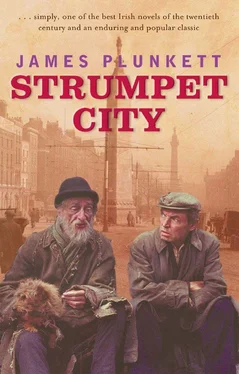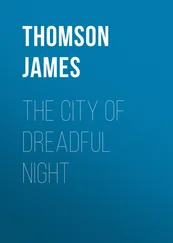Mrs. Bradshaw suffered too. She felt that Mary had justified Mr. Bradshaw’s frequent criticisms of her indulgence.
‘This is what comes of sentiment when dealing with servants,’ he said. ‘How many times have I spoken to you about it?’
‘It’s a great disappointment,’ was all she could offer in defence.
The lie had been discovered through her innocent reference to the visits in her letter to Mary’s father. His reply that there was no relative in Dublin and his anxiety to know what exactly could be going on made Mrs. Bradshaw regret her mention of the matter. She was fond of Mary. She felt there could be nothing seriously wrong.
‘It was terribly wicked of you,’ she said, ‘your father is so upset. I’m quite certain he thinks we have been lax.’
‘I’m very sorry,’ Mary offered. There was nothing else she could say.
‘And what necessity was there for it?’ Mrs. Bradshaw asked. ‘I never refused you permission to go out.’
Mary remained silent. She could not have asked permission week after week to see Fitz. People refused to trust young servants with young men. It was a part of their thinking to expect the worst. So she would have had to tell lies anyhow. There was no way out. Mrs. Bradshaw, in the absence of a reply, asked the question which her world considered unavoidable in such situations.
‘Have you been meeting any people? . . . I mean people of the opposite sex?’
Mary flushed at the implication which, however delicately Mrs. Bradshaw strove to push it into the background, remained in the question itself. She determined on this occasion not to lie. It was better to be punished than to go on with the deceit.
‘I’ve been meeting a young man . . . the same young man,’ Mary said.
The next question framed itself automatically, but Mrs. Bradshaw decided against asking it. She saw that Mary was suffering. Pity was always stronger in Mrs. Bradshaw than anger or anxiety.
Mary, who understood the hesitation, said: ‘There’s been nothing wrong between us.’ She was glad that the lies had ended.
‘I believe you,’ Mrs. Bradshaw said.
But Mr. Bradshaw was not so easily satisfied. His mind was quite made up and his conversation on the matter was punctuated by frequent raising and lowering of his perpetual newspaper.
‘She must go,’ he insisted.
‘The poor girl has done nothing wrong.’
‘We have only her word for it.’
‘I believe her.’
The newspaper was lowered.
‘You also believed her about this ridiculous aunt.’
Mrs. Bradshaw had no reply. She changed her voice and her tactics.
‘It seems such a pity to dismiss her.’
‘I fail to see why.’
‘I was thinking of the girl herself. We can’t give her a clear reference and without that she’ll find it impossible to get another position.’
‘She should have thought of that before she picked up with some young blackguard.’
‘They don’t have very much freedom. I’m sure it was all quite innocent.’
‘Innocent,’ Mr. Bradshaw repeated, bringing his newspaper down on his knees with a loud noise. ‘You mustn’t think these young girls are like yourself. They breed like rabbits. My God, woman, do you want her having babies all over the place?’
Mrs. Bradshaw changed colour. He noticed. Mistaking the reason, he apologised.
‘Forgive me if I sound crude, but we must face facts.’
It was not the crudeness which had upset Mrs. Bradshaw. In a small, dry voice she said: ‘I really don’t think it would arise.’
‘While there are hundreds of strong, willing and reliable girls to choose from, am I to sit by and see you saddled with an impressionable trollop. We pay for trustworthiness, my dear. We must make sure that we get it.’
Mrs. Bradshaw said, quietly: ‘I liked her. She suited me.’
‘You are being sentimental again. It is a constant fault of yours.’
‘Perhaps I am,’ Mrs. Bradshaw admitted. ‘I don’t think it so wrong to want to forgive.’
‘Nonsense. She goes back to her parents. A servant is not like an ordinary employee. One has moral responsibilities in the case of a servant.’
But Mary’s departure was delayed by the illness of Miss Gilchrist. The old woman’s collapse was gradual. In the course of the Christmas cleaning Mary helped her to shift the heavy furniture and noted the toll it took of her strength. She refused to rest on the grounds that the work had to be done. One day when they had moved the sideboard near the piano they discovered Father O’Connor’s beads, an amber and silver rosary in a worn purse. Miss Gilchrist put them in her apron pocket, saying she would return them personally later. Father O’Connor had become a favourite of hers and she recognised his property at once. She regarded him as something of a saint and never missed going to him for her monthly confession.
Less than an hour later she collapsed. Mary shouted for Mrs. Bradshaw and together they managed to take her to her room. They got her to bed. Mary lit the lamp and drew the curtains, cutting out the gloom of the December evening. The pallor of Miss Gilchrist’s face and her heavy breathing frightened her. They stayed watching her for a while until Mrs. Bradshaw said: ‘I think it would be as well to go for the doctor.’
During the next few days Mary, in between frequent errands, found an opportunity to contact Fitz again. She asked him to be near the gate at midnight on the following Sunday. Sunday was an early night in the Bradshaw household. When the rest had retired she would somehow get out to see him.
She made it a habit to sit with Miss Gilchrist during the night until after midnight. The old woman recovered a little, but remained too weak to be allowed up. On Sunday evening Father O’Connor called to see her. She had asked Mary to summon him. Mary left everything ready for the priest and withdrew. He gave no sign of being aware of the pending dismissal. When Miss Gilchrist had confessed to him he removed his purple stole, kissed it and folded it. He looked round the room. Miss Gilchrist smiled.
‘Haven’t I the height of comfort, Father,’ she said.
‘You have indeed,’ Father O’Connor said. ‘You’re the lucky woman.’
‘That shows you that I’m highly thought of.’
‘Are you long here?’ Father O’Connor asked.
‘Over thirty years.’
‘Then why wouldn’t you be highly thought of?’ he bantered, not without difficulty. He found it difficult to be easy and natural with a servant.
‘It isn’t always so,’ she said. ‘There’s some would dump you in an attic without fire or comfort.’
‘And who would have the heartlessness to do that?’ Father O’Connor reproved.
‘Many’s the one. I seen it and I know. Or pack you off to the Union the minute you showed a sign of feebleness. And why not, I suppose, when a poor body is not of their blood.’
‘Mr. and Mrs. Bradshaw are good people,’ he said.
‘That’s what I’m saying, Father.’
‘And most people are good too, but gossip doesn’t give them credit.’ He felt it might be no harm to slip in a few words about the danger of uncharitable talk. But he got no chance.
The old woman said next: ‘Hand me across my apron, Father.’
He looked around, searching, and saw it draped on a chair. A tiny wave of irritation at being commanded by the old woman moved inside him but was suppressed. He handed it to her. She rooted for the pocket and gave him the purse.
‘I found them for you when we were cleaning,’ she said, with wonderful pleasure.
He opened the purse and let the beads fall into his hands. To have them again choked him with happiness.
‘My rosary,’ was all he could say, ‘how can I thank you . . . ?’
Читать дальше












